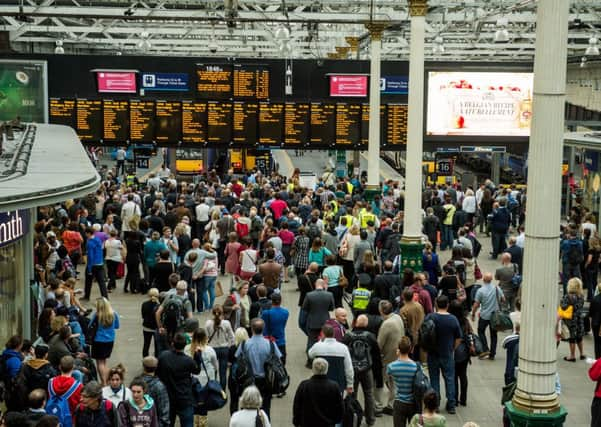Dunblane to Edinburgh train too small on 123 trips


Dr Richard Simpson MSP highlighted the case today, which saw passengers on the four-carriage 7:20am from Dunblane forced to squeeze into three coaches on 95 mornings, and into just two coaches on a further 28 dates.
Dr Simpson, Labour MSP for Mid Scotland and Fife, said travellers would be “rightly angry” at the overcrowding this had caused.
Advertisement
Hide AdAdvertisement
Hide AdHe said an evening rush hour train between Edinburgh and Dunblane had also been reduced in size 18 times over the same period - between 2011 and February this year.
ScotRail is fined by the Scottish Government’s Transport Scotland agency, which is in charge of the train operating franchise, £793 for every service reduced from four to two carriages, and £484 for each one reduced to three carriages.
Dr Simpson said: “At the time when rail fares have increased above inflation, passengers will rightly be angry at the overcrowding on trains.
“It is encouraging to see so many people using greener forms of transport, taking off some of the pressures on the road network.
“However, as a result of delayed trains and reduced capacity, large numbers of passengers are facing long stands.
“[Transport] minister Keith Brown should act to ensure disruptions are kept to absolute minimum.”
Mike Robbins, Labour councillor for Dunblane and Bridge of Allan, said: “As a Dunblane resident myself I know just how important these services are to getting commuters from Bridge of Allan and Dunblane to and from Edinburgh at these times.
“Local people will quite rightly expect the full number of carriages to be used at all times with very, very rare exceptions.”
Advertisement
Hide AdAdvertisement
Hide AdRobert Samson, a manager for official watchdog Passenger Focus, said:
“More people are taking the train in Scotland, so overcrowding has become a daily struggle for some commuters.
“In our latest survey, 75 per cent of passengers were satisfied with the amount of space they had to sit or stand on their train. This score is four per cent less than it was the year before.
“Unfortunately passengers using the Edinburgh-Dunblane line are frequently being ‘robbed’ of their train carriages which are being diverted to even busier routes.
“Significant, sustained, long-term investment is necessary to not only reduce overcrowding, but to ensure that it doesn’t get worse if passenger numbers continue to increase.”
A Transport Scotland spokesman said: “The ScotRail operator is subject to charges where train capacities are reduced. This is to help ensure a full and adequate service throughout the network and has been part of the franchise agreement since 2004.
“We recognise that on some occasions it may be necessary for carriages to be moved at short notice for maintenance.
“While this is at the discretion of the operator, Transport Scotland applies these charges to encourage alternative solutions where possible.
Advertisement
Hide AdAdvertisement
Hide Ad“In all, we are encouraged to be seeing significant year-on-year improvement on this matter and urge ScotRail to ensure this continues.
A ScotRail spokesman said: “We understand – and share – passengers’ frustration when we are forced to run shorter trains than normal.
“Customers should be assured this takes place only when other options have been exhausted.
“We remain committed to continually improving Scotland’s railways with the resources available to us - and have repeatedly broken records for performance and punctuality during 2014.”
The spokesman said its peak fares were capped at inflation in January and would be again next year.